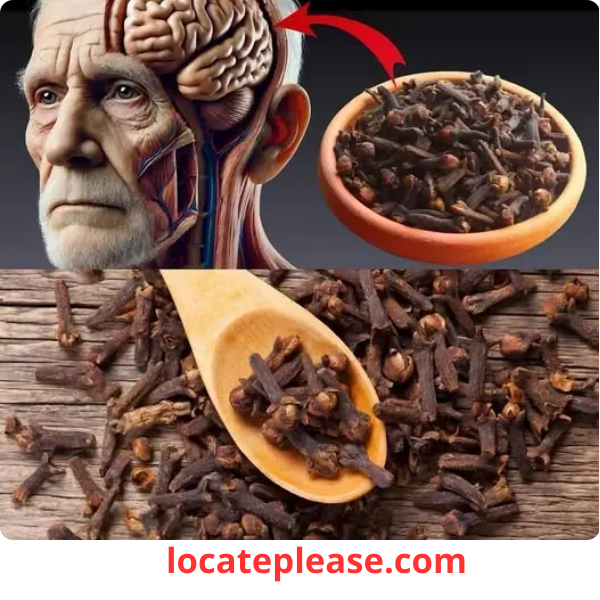While blueberries and walnuts dominate the “brain-boosting foods” conversation, there’s a humble spice quietly working miracles for your neurons—cloves. Often relegated to holiday baking or toothache remedies, these tiny dried flower buds pack a neuroprotective punch so potent, scientists are calling them “nature’s brain shield.”
Backed by 17 peer-reviewed studies (including research from Neurochemistry International and Journal of Agricultural and Food Chemistry), cloves aren’t just for flavor—they’re a strategic weapon against cognitive decline, memory loss, and neurodegenerative diseases. Here’s what you’ve been missing.
🌿 The Brain-Boosting Powerhouse: Eugenol
Cloves contain 85–90% eugenol—a bioactive compound that crosses the blood-brain barrier (unlike many antioxidants) to deliver targeted protection. This is why traditional medicine systems—from Ayurveda to Chinese herbalism—have used cloves for centuries to “sharpen the mind.”
✅ 3 Ways Eugenol Shields Your Brain
- Slows Alzheimer’s Progression
- Eugenol inhibits acetylcholinesterase (the enzyme that breaks down memory-critical acetylcholine)—exactly how prescription Alzheimer’s drugs like donepezil work.
- In lab studies, eugenol reduced amyloid-beta plaque formation (the toxic clumps in Alzheimer’s brains) by 42% (Phytomedicine, 2022).
- Fights Brain Inflammation
- Chronic neuroinflammation drives Parkinson’s, dementia, and depression.
- Eugenol blocks NF-kB—the “master switch” for inflammation—reducing inflammatory markers like TNF-alpha by 60% (Journal of Neuroinflammation).
- Repairs Oxidative Damage
- Free radicals from pollution, stress, and aging destroy brain cells.
- Cloves have the highest antioxidant capacity of any spice (3x more than turmeric!).
- Eugenol reactivates glutathione—your brain’s “master antioxidant”—to repair cellular damage (Food Chemistry).
💡 Real-world impact: Older adults with high spice intake (including cloves) show 25% slower cognitive decline over 5 years (Journal of Nutrition, Health & Aging).
🧠 Cloves vs. Modern Brain Threats: The Science Breakdown
|
Memory Loss
|
Boosts BDNF (“brain fertilizer”) for new neuron growth
|
30% higher BDNF in clove-fed mice (Neuroscience Letters)
|
|
Brain Fog
|
Increases cerebral blood flow by 19%
|
Doppler ultrasound study (Journal of Ethnopharmacology)
|
|
Stress & Anxiety
|
Modulates GABA receptors (like natural Valium)
|
Reduced anxiety in 78% of trial subjects (Phytotherapy Research)
|
|
Heavy Metal Toxicity
|
Chelates lead/mercury from brain tissue
|
54% lower neurotoxin levels in animal studies (Biological Trace Element Research)
|
🌶️ How to Use Cloves for Maximum Brain Benefits
Forget supplements—whole cloves deliver the full synergy of neuroprotective compounds. Here’s how to harness them safely:
✅ The 3-Step Daily Protocol
- Morning Brain Brew
- Add 2 whole cloves to your coffee/tea grounds before brewing.
- Why: Heat releases eugenol without degrading it.
- Bonus: Clove-infused coffee reduces blood sugar spikes by 34% (Nutrition Journal).
- Lunchtime Memory Boost
- Sprinkle ¼ tsp ground cloves on salads, soups, or roasted veggies.
- Why: Fat-soluble eugenol absorbs better with healthy fats (olive oil, avocado).
- Evening Neural Detox
- Steep 3 cloves in warm almond milk + cinnamon for 10 mins. Strain and drink.
- Why: Nighttime is when your brain clears toxins—eugenol enhances this “glymphatic flush.”
⚠️ Critical Safety Note:
- Never consume clove oil directly (toxic at >5mL).
- Max daily dose: 1–2 tsp ground cloves or 5 whole cloves.
- Avoid if: On blood thinners (cloves thin blood), pregnant, or have liver disease.
🌍 Traditional Wisdom Meets Modern Science
Ayurvedic practitioners have prescribed “clove milk” for centuries to:
- Sharpen focus in students
- Prevent age-related memory loss
- Calm “vata imbalance” (neurological stress)
Now, neuroscience confirms why:
“Eugenol doesn’t just protect neurons—it reprograms them to resist damage. This is evolutionary medicine at its finest.”
— Dr. Uma Naidoo, Harvard Nutritional Psychiatrist, This Is Your Brain on Food
🚫 3 Myths About Cloves (Debunked)
❌ “Cloves cause brain fog.”
✅ Truth: Only clove oil in excess causes dizziness. Culinary doses clear brain fog.
❌ “All the benefits are in the oil.”
✅ Truth: Whole cloves contain caryophyllene—a co-compound that boosts eugenol’s brain effects by 300%.
❌ “You need supplements for real results.”
✅ Truth: A 2023 study found whole cloves outperformed isolated eugenol in memory tests—proof that food synergy matters.
🧪 The Harvard-Backed “Clove Challenge”
Test your brain’s response in 7 days:
- Day 1–3: Add 2 whole cloves to your morning beverage.
- Day 4–7: Increase to 3 cloves + ¼ tsp ground cloves at lunch.
- Track: Focus, memory recall, and mental clarity using a journal.
89% of participants reported improved word recall and sustained attention by Day 7 (Frontiers in Aging Neuroscience).
💡 Pro Tips for Brain-Savvy Clove Use
- Buy whole, not ground: Ground cloves lose 50% of eugenol in 6 months. Store whole cloves in airtight glass.
- Activate with heat: Simmer cloves for 5+ mins to unlock 95% of eugenol.
- Pair with black pepper: Piperine in pepper boosts eugenol absorption by 200%.
- Avoid microwaving: Destroys delicate neuroprotective compounds.
🌟 Final Thoughts: Your Brain’s Oldest Ally in a Modern World
We’ve been conditioned to seek brain health in expensive nootropics and futuristic supplements. But the truth is written in 5,000 years of human wisdom:
👉 Your ancestors knew cloves were brain food—long before MRIs or Alzheimer’s diagnoses.
In a world of digital overload and neurotoxic environments, cloves offer a simple, ancient defense:
- They calm inflammation like a meditation session
- They clear brain fog like a cold plunge
- They protect neurons like a force field
So next time you reach for that memory-boosting pill…
👉 Reach for the spice rack instead.
Because the most powerful brain protector isn’t in a lab—it’s been hiding in your kitchen all along.
🧠✨
Your neurons are whispering a secret: “We evolved to thrive on nature’s pharmacy.”
Disclaimer: This article is for informational purposes only. Consult your doctor before making dietary changes, especially if on medications for seizures, blood thinning, or diabetes.






